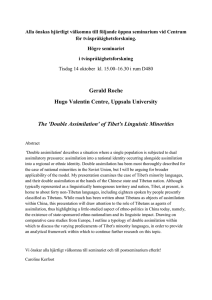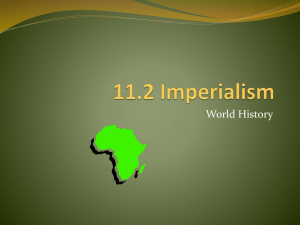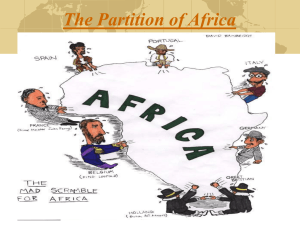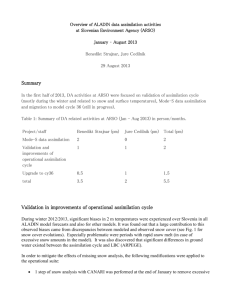FRENCH ASSIMILATION POLICY
advertisement
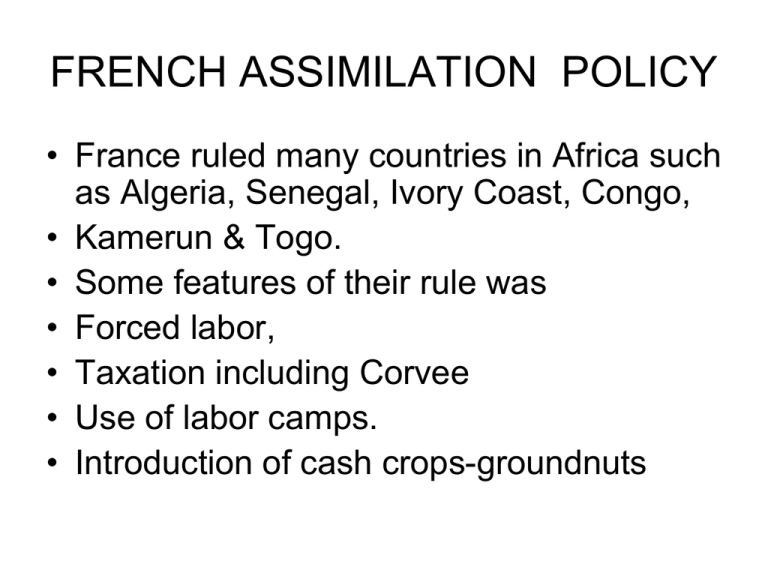
FRENCH ASSIMILATION POLICY • France ruled many countries in Africa such as Algeria, Senegal, Ivory Coast, Congo, • Kamerun & Togo. • Some features of their rule was • Forced labor, • Taxation including Corvee • Use of labor camps. • Introduction of cash crops-groundnuts Assimilation • derived from French word assimiler meaning to resemble. • Believed their civilization had attained highest standard and set out to impose their culture on other nations. • Believed other people could be assimilated into French culture • regardless of their race. Believed that what was good for France was good for other nations. • Hence strove to turn Africans into black Frenchmen Speaking, living, • behaving & thinking as Frenchmen= mental colonization • Meant to influence every aspect of life Assimilation Difficulties • For it to succeed they needed to indoctrinate the mind. But it was difficult since what was good for Frenchman was not necessarily good for the African • It was difficult to erase peoples culture, since culture was the basis of their existence. Africans are so deeply rooted in their cultural values and opposed any cultural imperialism. • French realized that Assimilation when pushed to the fullest would lead to end of colonialism since Africans would be equal to them so they changed their policy to accommodation Assimilation • Colonies were taken to be overseas provinces of France ,administratively and politically. • Policy was seriously pursued in Senegal especially in the • 4 Communes of St. Louis, Goree, Rufisque and Dakar • Education - was opened in these areas similar to that in • France as opposed to British education • Elections - were also as in France based on universal • male suffrage with Frenchmen and Africans having same • voting rights e.g. could vote and be voted in, • British Territories Africans were represented by missionaries French Administration • Trade however was in the hands of the French companies. • Blacks and whites living in the communes had same rights and equal protection under judicial system. • Politically, Senegal was represented in the French chamber of deputies in most cases by black people, e.g., Blaise Diagne was the first black elected deputy to the French Chamber of Deputies in 1914. • And through his efforts residents of the 4 communes were granted French citizenship. Administration • However the African French Citizens were treated differently from the rest. • But when French Introduced other values each land as individual property it failed since in African land was communally owned. • On Culture like marriage, Most Senegalese were Muslims as such practiced Polygamy but French were Christians who believed in monogamy. So for Africans to be fully assimilated they had to be monogamous which was difficult. Education • did not promote Assimilation fully since they were run by Catholic missionaries who were interested in converting people instead of assimilating them. • People rejected education offered to them. • Africans started after 1946 to demand for more rights to be citizens as French did all they could to stop it, having realized the dangers of Assimilation. Negritude: an African response to Assimilation. • • Was a cultural and Political movement that celebrated black power and black beauty. • Was started in French Speaking countries of Africa and West Indies. • Negritude challenged the French Policy of Assimilation and the • main proponent was the founder and First President of Senegal- • Leopold Sedar Senghor. • Negritude celebrated the total cultural, social and political values of • African civilization and blacks as a whole in the world. • It challenged the concept of Assimilation which was based on false • grounds that Africans had no history or culture of their own • Negritude set out to demonstrate that Africans had contributed and were still contributing to the world civilizations.


